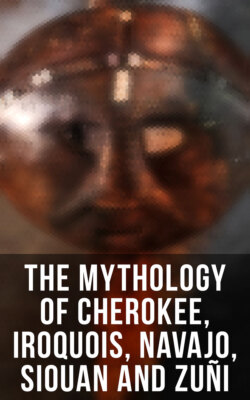Читать книгу The Mythology of Cherokee, Iroquois, Navajo, Siouan and Zuñi - James Mooney - Страница 243
На сайте Литреса книга снята с продажи.
Haida Demi-Gods
ОглавлениеThere is a curious Haida story told of the origin of certain supernatural people, who are supposed to speak through the shamans, or medicine-men, and of how they got their names.
Ten brothers went out to hunt with their dogs. While they were climbing a steep rocky mountain a thick mist enveloped them, and they were compelled to remain on the heights. By and by they made a fire, and the youngest, who was full of mischief, cast his bow in it. When the bow was burnt the hunters were astonished to see it on the level ground below. The mischievous brother thereupon announced his intention of following his weapon, and by the same means. Though the others tried hard to dissuade him, he threw himself on the blazing fire, and was quickly consumed. His brothers then beheld him on the plain vigorously exhorting them to follow his example. One by one they did so, some boldly, some timorously, but all found themselves at last on the level ground.
As the brothers travelled on they heard a wren chirping, and they saw that one of their number had a blue hole in his heart. Farther on they found a hawk's feather, which they tied in the hair of the youngest. They came at length to a deserted village on the shores of an inlet, and took possession of one of the huts. For food they ate some mussels, and having satisfied their hunger they set out to explore the settlement. Nothing rewarded their search but an old canoe, moss-grown and covered with nettles. When they had removed the weeds and scraped off the moss they repaired it, and the mischievous one who had led them into the fire made a bark bailer for it, on which he carved the representation of a bird. Another, who had in his hair a bunch of feathers, took a pole and jumped into the canoe. The rest followed, and the canoe slid away from the shore. Soon they came in sight of a village where a shaman was performing.
Attracted by the noise and the glow of the fire, the warrior at the bow stepped ashore and advanced to see what was going on. "Now," he heard the shaman say, "the chief Supernatural-being-who-keeps-the-bow-off is coming ashore." The Indian was ashamed to hear himself thus mistakenly, as he thought, referred to as a supernatural being, and returned to the canoe. The next one advanced to the village. "Chief Hawk-hole is coming ashore," said the shaman. The Indian saw the blue hole at his heart, and he also was ashamed, and returned to his brothers. The third was named Supernatural-being-on-whom-the-daylight-rests, the fourth Supernatural-being-on-the-water-on-whom-is-sunshine, the fifth Supernatural-puffin-on-the-water, the sixth Hawk-with-one-feather-sticking-out-of-the-water, the seventh Wearing-clouds-around-his-neck, the eighth Supernatural-being-with-the-big-eyes, the ninth Supernatural-being-lying-on-his-back-in-the-canoe, and the eldest, and last, Supernatural-being-half-of-whose-words-are-raven. Each as he heard his name pronounced returned to the canoe. When they had all heard the shaman, and were assembled once more, the eldest brother said, "We have indeed become supernatural people," which was quite true, for by burning themselves in the fire they had reached the Land of Souls.1
